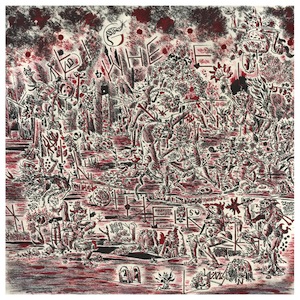Unless you are listening to one of his seven albums, perhaps a little hypnotised by his gifts and the one setting in which everything about Cass McCombs seems to make sense, this artist can seem a perplexing figure. There are few like him; his distaste for all things ‘industry’ and ‘promotion’ is well documented, while he categorically refuses to put any of his songs in any sort of context. On stage he sings his songs and offers no engagement whatsoever, while still being an electrifying performer. In 2011 he released two compelling, confusing and challenging albums in Wit’s End and Humor Risk, the latter he promoted by only doing postal interviews. If that wasn’t enough to make an awkward fit with a culture driven by snap judgements, instant accessibility and short attention spans, here is an album with 22 tracks of wilful, exploratory music and his familiar wizened poetry. And a cover of a Thin Lizzy song.
There is no getting around the fact Big Wheel And Others is a slog on first listen and will always remain so for some. Yet McCombs is nothing if not a songwriter who knows catchiness: somehow, each of these songs is memorable for its structure and compositional bite, though some are better than others. The triumphs are among the best things he has done. ‘Angel Blood’, for example, returns him to the melodic prettiness of 2007’s Dropping The Writ, an album that in the cleanliness of its production and general loveliness is looking increasingly like a one-off anomaly in the context of his entire output.
‘Morning Star’ is along vaguely similar lines, seeing McCombs revert to the troubadourish self that taken in isolation might posit him as a more conventional singer-songwriter. Yet lines such as "What’s it like to shit in space?" thwart that idea immediately – indeed the notion of sweetness disrupted by something unseemly, disgusting or even violent is a theme of this record, perhaps most notably in the fade- out of the sumptuous ‘Sooner Cheat Death Than Fool Love’ into the bizarre ‘Satan Is My Toy’, a track that sounds so dramatically unlike a Cass McCombs song, with its brash, heavy rock guitar line, as to disrupt the album’s coherence. But that disruption and meddling is the point.
The late Karen Black, who sang on the cutting, sardonic ‘Dreams Come True Girl’ on 2009’s Catacombs, is on hand to get involved with this idea. She sings a version of the single ‘Brighter’ (the ‘original’ with vocals by McCombs is included earlier on the album), with her throaty, firm voice delivering lines about criminals escaping, her ‘ass’ (rhymed with ‘Cass’) and, directed at housewives: "I hope you all die". Before her death in August, she said of McCombs: "He’s so cute lookin’. He’s just the darlingest boy." The adorable surface seems to be pervasive.
One question Big Wheel And Others brings up is of McCombs’ place as one of the few genuinely counter-cultural songwriters who dwell on anything resembling the ‘fringes’. His own life is apparently a restless existence, staying nowhere for long and dependent on friends, and this album is populated by criminals and outcasts, for whom he has fervent sympathy. There is also a strong theme of physical labour. The title track begins with "I dig the taste of diesel and the sound of big rigs", with the ‘big wheel’ in question being one of colossal machinery.
There is no particular point being made about any ‘honour’ in blue collar work, more a devastating, cinematic and vivid portrait of lives that scrape by against spectres of ruin and oblivion. "Dealing is better than kneeling" he sings in ‘Dealing’; "Cutting a powder with the Irish mob" emerges in ‘Joe Murder’ while "Let’s see whose hands have the most blisters" is a line in ‘Everything Has To Be Just So’. Speaking of cinematic, this must be, somehow, McCombs’ most visual poetry yet: the miseries of John Cassavetes and the warped Americana of Sam Peckinpah are both evoked.
Musically, a key to the urgency and intensity that haunts McCombs’ best work is repetition. From 2003 album A‘s ‘My Master’ to Wit’s End‘s ‘Robin Egg Blue’, the pattern of a solid riff being repeated, augmented and distorted is a signature move, and here he has perhaps delivered this art’s greatest triumph with the exquisite ‘Home On The Range’, its coruscating guitar refrain, building to a crescendo of abandon and anger, being Big Wheel‘s finest moment.
A 22-track album invites accusations of indulgence and an inability to self-edit. But saying Cass McCombs sprawls too much, or that some of these rough, unkempt songs are somehow ‘unfinished’, is like, for argument’s sake, saying My Bloody Valentine’s weakness is that they are too loud or that Tom Waits’ voice is too growly. Multiplicity and uncertainty are the cornerstones of Cass McCombs’ music, beautifully on display on Big Wheel.
It seems inappropriate to call this his best album. At least four records of his seven have claim to that mantle. Yet this is by far his most ambitious, taking enough weird and disarming turns to make the fact it is 85 minutes long irrelevant. Big Wheel is about as pure as creativity gets within the pop/folk/rock realm in which McCombs is awkwardly housed.
And all this without covering perhaps the two oddest things about Big Wheel: the reinterpretation of Thin Lizzy’s ‘Honesty Is No Excuse’, and the series of snippets from Sean, the 1970 documentary by Ralph Arlyk, where a sweet-voiced four-year-old details his consumption of marijuana and throwing bombs at police. Perfect.


